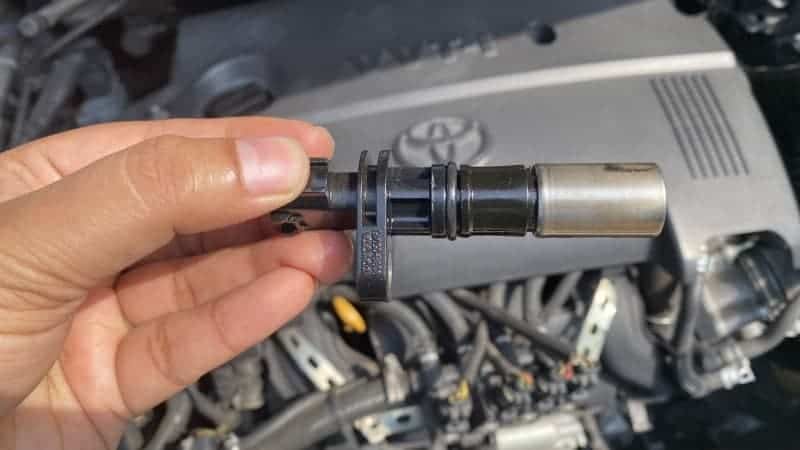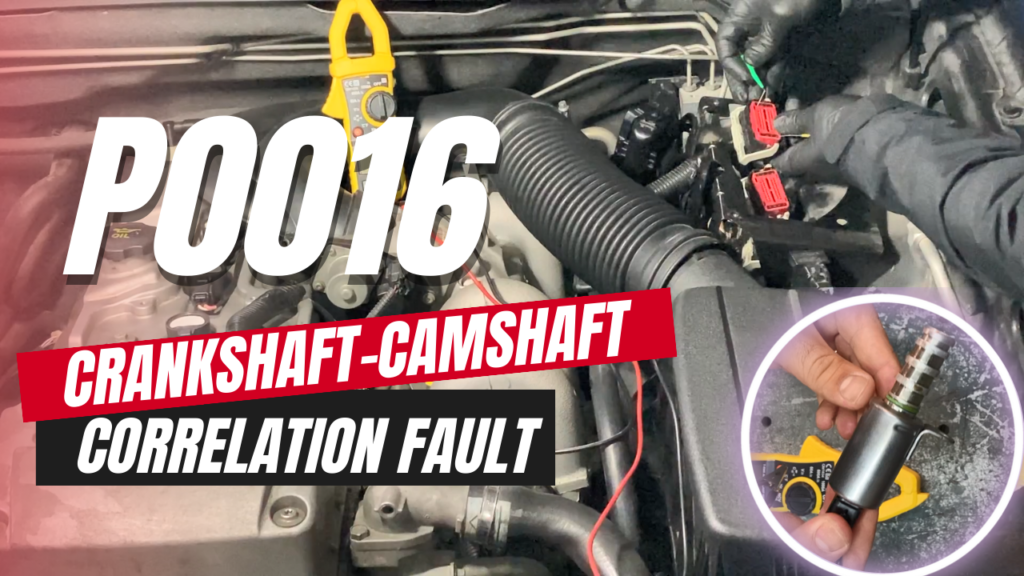| COMPONENT LOCATION |

| GENERAL DESCRIPTION |
The Crankshaft Position Sensor (CKPS) is a magnetic generator type sensor that generates voltage using a sensor and a target wheel mounted on the crankshaft. There are 58 slots in the target wheel with one longer slot. When the slot in the wheel aligns with the sensor, the sensor voltage output is low. When the metal (tooth) in the wheel aligns with the sensor, the sensor voltage output is high. During one crankshaft rotation there are 58 signwave signals with one longer signal. The ECM calculates engine RPM by using the sensor’s signal and controls the injection timing and the ignition timing. Using the signal differences caused by the longer slot, the ECM identifies which cylinder is at top dead center.
| DTC DESCRIPTION |
Checking reference signals from CKPS under detecting condition, if any signal is detected for more than 0.15 sec., ECM sets P0335.
| DTC DETECTING CONDITION |
| Item | Detecting Condition | Possible Cause | ||||||||||
| DTC Strategy |
|
| ||||||||||
| Enable Conditions |
| |||||||||||
| Threshold value |
| |||||||||||
| Diagnosis Time |
| |||||||||||
| MIL On Condition |
|
| SPECIFICATION |
| Item | Specification |
| Coil Resistance (Ω) | 774 ~ 946 [20°C(68°F)] |
| Airgap (mm) | 0.5 ~ 1.5 mm |
| DIAGNOSTIC CIRCUIT DIAGRAM |

| SIGNAL WAVEFORM & DATA |

Fig.1) Normal waveforms of CKPS & CMPS
| MONITOR GDS DATA |
| 1. | Connect GDS to Data Link Connector(DLC). |
| 2. | IG “ON”. |
| 3. | Select “DTC” button, and then Press “DTC Status” to check DTC’s information from the DTCs menu. |
| 4. | Read “DTC Status” parameter.
|
| 5. | Is parameter displayed “Present fault”?
|
| TERMINAL AND CONNECTOR INSPECTION |
| 1. | Many malfunctions in the electrical system are caused by poor harness and terminals. Faults can also be caused by interference from other electrical systems, and mechanical or chemical damage. |
| 2. | Thoroughly check connectors for looseness, poor connection, bending, corrosion, contamination, deterioration, or damage. |
| 3. | Has a problem been found?
|
| SIGNAL CIRCUIT INSPECTION |
| ■ Check voltages |
| 1. | IG “OFF” and disconnect CKPS connector. |
| 2. | IG “ON”. |
| 3. | Measure voltage between low signal terminal of CKPS harness connector and chassis ground. |
| 4. | Measure voltage between high signal terminal of CKPS harness connector and chassis ground.
|
| 5. | Is the measured voltage within specification ?
|
| ■ Check open in harness |
| 1. | IG “OFF” and disconnect CKPS connector and ECM connector. |
| 2. | Measure resistance between low signal terminal of CKPS harness connector and CKPS low signal terminal of ECM harness connector. |
| 3. | Measure resistance between high signal terminal of CKPS harness connector and CKPS high signal terminal of ECM harness connector.
|
| 4. | Is the measured resistance within specification ?
|
| COMPONENT INSPECTION |
| ■ Check CKPS |
| 1. | IG “OFF” and disconnect CKPS connector. |
| 2. | Measure resistance between low signal and high signal terminals of CKPS connector.(Component side)
|
| 3. | Is the measured resistance within specification ?
|
| ■ Check signal waveform of CKPS |
| 1. | IG “OFF” and connect GDS. |
| 2. | NG “ON” and Measure signal waveform at signal terminal of CKPS.
Fig.1) Normal waveforms of CKPS & CMPS
|
| 3. | Is the measured siganl waveform normal?
|












